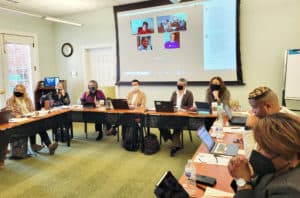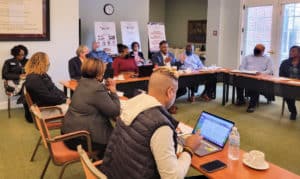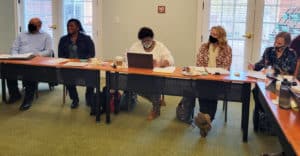Creation of RDEI Standing Committee, Commitment to Anti-Bias and RDEI Training Highlight CHHSM Board’s November Meeting

An increased commitment to Race, Diversity, Equity and Inclusion (RDEI) marked the recent meeting of the Council for Health and Human Service Ministries Board, held Nov. 15-17 in Chicago. The meeting was the first in-person and Zoom hybrid meeting since the COVID-19 pandemic began, and was held at three Chicago-area CHHSM member sites: UCAN on Nov. 15, Plymouth Place on Nov. 16, and Advocate Aurora Health on Nov. 17.
In a unanimous vote, the Board created an RDEI standing committee. During the course of various committee meetings, it had become clear to Board members that there needed to be a more intentional way to honor CHHSM’s RDEI work. “The RDEI Taskforce is doing great work but, by definition, a taskforce is decommissioned when its work is done,” said Michael J. Readinger, president and CEO of CHHSM. “This work will never be ‘done’ so a standing committee makes great sense.”
The Board named Board members Dani Loving Cartwright, vice president of operations for the Christian Church (Disciples of Christ)’s National Benevolent Association in St. Louis, and the Rev. Dr. Sheila Harvey Guillaume, pastor of Union Congregational UCC in West Palm Beach, Fla., as co-chairs of the new committee.
“I am thrilled to co-chair the RDEI Standing Committee for the next year with Rev. Sheila Guillaume,” said Loving Cartwright. “CHHSM has moved in intentional ways to embrace RDEI principles into their work, and it makes sense for the Board to do the same. The work that we are doing at the National Benevolent Association, CHHSM’s collaborator in the Christian Church (Disciples of Christ), has convicted me of the importance of this work reflected in both an organization and its governing body.”
Prior to the vote, the Board had discussed how to create such a committee without having held meaningful training sessions. To remedy this, the Board further approved holding anti-bias and RDEI Zoom training sessions in early 2022.
During the meeting, “we celebrated each other and we also challenged each other to grow in the RDEI space and make our commitments firm in learning and doing more, both personally and professionally,” said Stephanie Franklin, senior vice president of UCAN and a CHHSM Board member. “Before we can share CHHSM’s RDEI journey and ask others to accompany us in this lifelong commitment, we have to first do the work as a Board, and we will be coordinating two additional trainings in the coming months to keep us anchored in this commitment.”

The anti-bias training will teach participants about the inherent and intrinsic biases that everyone possesses, subtle biases that stand in the way of making decisions that help create a diverse, inclusive and equitable workplace and society. The RDEI training will be a comprehensive study, examining the history of the causative factors that have led to a racist society that empowers white supremacy culture. “It also will look at the steps we can take to dismantle that culture and move along the continuum of becoming an anti-racist people and organization,” Readinger said.
During the Tuesday, Nov. 16, session at Plymouth Place, the Board reviewed its RDEI work, including its Welcoming Diversity Affinity Group and its work with the UCC’s Join the Movement initiative for racial justice. The Board also held a generative session to discuss creating an equity lens tool for use in decision making. The goal is to create a truly diverse, inclusive and equitable framework that guides all CHHSM decision making processes.
“An equity lens helps groups reflect on the potential impact of decisions before they are made by asking questions about how people who are often marginalized may be empowered or isolated by the decision, how bias and privilege may be at play, and how racial and other power dynamic can be counteracted,” said the Rev. George Graham, vice president of CHHSM. “Asking these kinds of questions and being sensitive to these dynamics in a group helps ensure that decision-making is more inclusive and the result is more equitable.”
The three CHHSM member locations were a highlight of the Board meeting. “It was wonderful to be able to gather together in person again, especially while visiting three member organizations,” said Michelle Just, Board vice chair and president and CEO of Beatitudes Campus in Phoenix. “UCAN, Plymouth Place, and Advocate Aurora Health offered the Board a welcome of radical hospitality that set the tone for the meeting. As a result, we were able to continue in person the important RDEI work that we began over the summer. It was an enlightening and informative meeting.”
During the Nov. 15 meeting at UCAN, Board members received a tour of UCAN’s healing garden, a beautiful space of art, landscaping, peace, healing, and solitude. During the meeting at Plymouth Place Nov. 16, members were treated to a tour of the community and saw plans for its future expansion. On Nov. 17, Board members learned about Advocate Aurora Health’s program around spiritual care, RDEI work, and community health through presentations by the Rev. Dr. Kirsten Peachey, a CHHSM Board member and Advocate Aurora’s director of faith and health partnerships, and the Rev. Kathie Bender Schwick, Advocate Aurora’s chief spiritual officer.

Board member the Rev. Dr. Monica Dawkins-Smith, the UCC’s executive associate for Wider Church Ministries and operations, said that the RDEI commitment by both the Board and the CHHSM member agencies was uplifting. “I left the meeting feeling inspired by the common narratives shared by all three member organizations about their RDEI implementation efforts,” she said.
UCAN’s Franklin said she was grateful for the meeting, which she called a “learning experience.”
“We started our week by learning tips on how to avoid bias in the hiring process and we visited three ministries to hear their stories and how they impact staff, residents, families, and communities,” said Franklin. “From UCAN combatting violence in Chicago by offering job training and placement programs and direct community intervention, to watching residents at Plymouth Place teach English as a second language, to hearing how Advocate Aurora Health is advancing healthy equity for black and brown communities — it was a powerful agenda.”
Readinger concurred. “The work accomplished by our Board while meeting at our CHHSM member sites was invaluable,” he added. “It was the next step as we move forward together in creating a more just, equitable, diverse, inclusive and compassionate world.”
Join Our Mailing LIst
Follow on Facebook
Iredell Adult Day Services Hosts Ribbon-Cutting to Celebrate Adult Day Health Certification - CHHSM
www.chhsm.org
Iredell Adult Day Services (IADS) in Newton, N.C. — a nonprofit organization dedicated to caring for older adults, vulnerable groups, and their families, and part of EveryAge — hosted a ribbon cut...